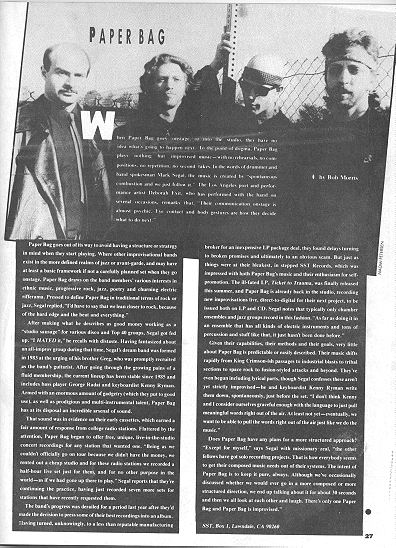

When Paper Bag goes onstage, or into the studio, they have no idea what's going to happen next. To the point of dogma, Paper Bag plays nothing but improvised music- with no rehearsals, no compositions, no repetition, no second takes. In the words of drummer and band spokesman Mark Segal, the music is created by "spontaneous combustion and we just follow it." The Los Angeles poet and performance artist Debra Exit, who has performed with the band on several occasions, remarks that, "Their communication onstage is almost psychic. Eye contact and body gestures are how they decide what to do next."
Paper Bag goes out of its way to avoid having a structure or strategy in mind when they start playing. Where other improvisational bands exist in the more defined realms of jazz or avante-garde, and may have at least a basic framework if not a carefully planned set when they go onstage, Paper Bag draws on the band members' various interests in ethnic music, progressive rock, jazz, poetry and churning electric rifferama. Pressed to define Paper Bag in traditional terms of rock or jazz, Segal replied, "I'd have to say we lean closer to rock, because of the hard edge and the beat and everything."
After making what he describes as good money working as a "studio sausage" for various disco and Top 40 groups, Segal got fed up. "I HATED it," he recalls with distaste. Having fantasized about an all-improv group during this time, Segal's dream band was formed in 1983 at the urging of his brother Greg, who was promptly recruited as the band's guitarist. After going through the growing pains of a fluid membership, the current lineup has been stable since 1985 and includes bass player George Radai and keyboardist Kenny Ryman. Armed with an enormous amount of gadgetry (which they put to good use), as well as prodigious and multi-instrumental talent, Paper Bag has at its disposal an incredible arsenal of sound.
That sound was in evidence in their early cassettes, which earned a fair amount of response from college radio stations. Flattered by the attention, Paper Bag began to offer free, unique, live-in-the-studio concert recordings for any station that wanted one. "Being as we couldn't officially go on tour because we didn't have the money, we rented out a cheap studio and for these radio stations we recorded a half-hour live set just for them, and for no other purpose in the world- as if we had gone up there to play." Segal reports that they're continuing the practice, having just recorded seven more sets for stations that have recently requested them.
The band's progress was derailed for a period last year after they'd made the decision to press some of their best recordings into an album. Having turned, unknowingly, to a less than reputable manufacturing broker for an inexpensive LP package deal, they found delays turning to broken promises and ultimately to an obvious scam. But just as things were at their bleakest, in stepped SST Records, which was impressed with both Paper Bag's music and their enthusiasm for self-promotion. The ill-fated LP, Ticket To Trauma, was finally released this summer, and Paper Bag is already back in the studio, recording new improvisations live, direct-to-digital for their next project, to be issued both on LP and CD. Segal notes that typically only chamber ensembles and jazz groups record in this fashion." As far as doing it in an ensemble that has all kinds of electric instruments and tons of percussion and stuff llike that, it just hasn't been done before."
Given their capabilities, their methods and their goals, very little about Paper Bag is predictable or easily described. Their music shifts rapidly from King Crimson-ish rock passages to industrial blasts to tribal sections to space rock to fusion-styled attacks and beyond. They've even begun including lyrical parts, though Segal confesses these aren't yet strictly improvised- he and keyboardist Kenny Ryman write them down, spontaneously, just before the set. "I don't think Kenny and I consider ourselves graceful enough with the language to just pull meaningful words right out of the air just like we do the music."
Does Paper Bag have any plans for a more structured approach? "Except for myself", says Segal with missionary zeal, "the other fellows have got solo recording projects. That is how everybody seems to get their composed music needs out of their systems. The intent of Paper Bag is to keep it pure, always. Although we've occasionally discussed whether we would ever go in a more composed or more structured direction, we end up talking about it for about 30 seconds, and then we all look at each other and laugh. There's only one Paper Bag and Paper Bag is improvised."